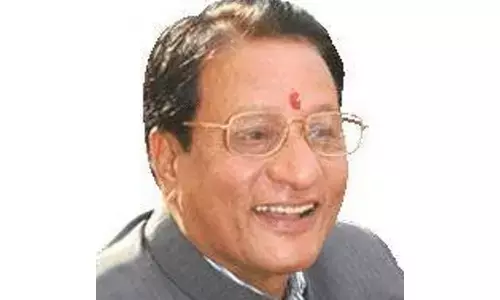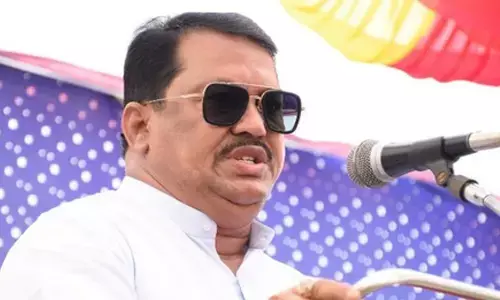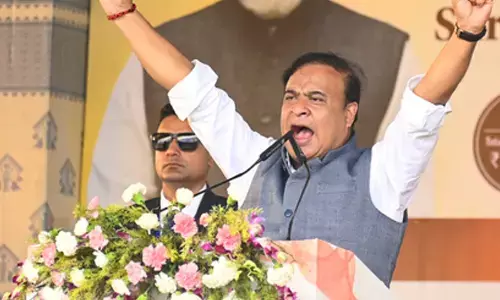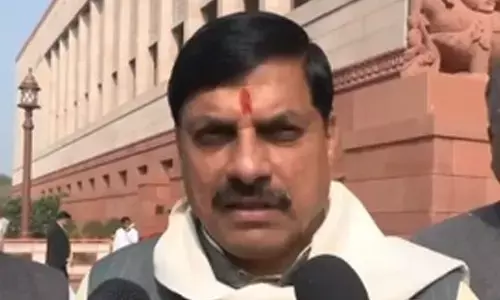ISF 2024 to bring together 50,000 startups from 15 countries in Hyderabad
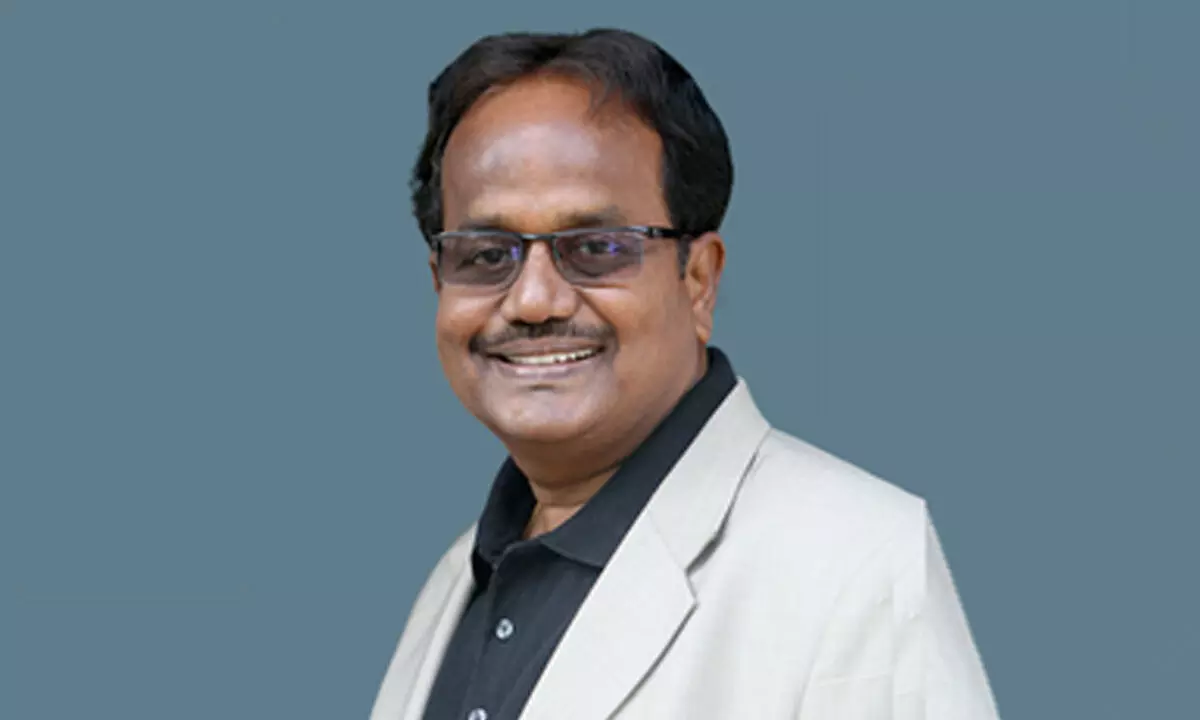
The International Startup Festival is returning for its third edition in Hyd. This year’s event is set to be larger than ever, attracting startups, investors, and delegates from around the world
The much awaited International Startup Festival (ISF) is back. The ISF has grown bigger with every passing year. The second edition of ISF, which was held in Bangalore last year, witnessed participation of more than 30 speakers, 500 venture capitalists, HNIs, angel investors, over 100 CEOs and CXOs, and 10,000 startups. The third edition, scheduled to be held during September 26-28, 2024, in Hyderabad, is going to attract 50,000 startups, 2,000 exhibitors, 250 CXOs, 300 VCs, 800 global angels, and 5,000 delegates from 15 countries.
ISF-2024, organised by International Startup Foundation, is the brainchild of a visionary leader, serial entrepreneur and a multifaceted person, JA Chowdary. He has successfully helmed vital roles including that of Founding Director of Software Technologies Parks of India, Chief Architect of Hi-Tec City in Hyderabad, Founding member of PortalPlayer, Co-founder of TalentSprint, and Chairman of India Blockchain Technology Standards Committee. In an interview, JA Chowdary, well known as JA, shares insights about the changing technology landscape and India’s thriving startup ecosystem.
What is unique about this year’s International Startup Festival?
Last year’s International Startup Festival focused on rural economy as we had noticed that startups have wide scope in solving real problems of rural India. This year’s conference is focused on how AI can be useful for startups to come up with new products or solutions quickly. Earlier, in the absence of AI tools developing a solution would take lot of time. Today with a prompting technology, developing a solution, time to market, idea to realisation gets fastracked which increases chances of survival of the startup. Hence, this year, ISF will focus on three Ms, which is, money, mentorship and marketing for early and growth stage startups. This year, 50,000 startups have registered of which 150 will participate in the Demo Day. These startups will be segregated based on the sector they operate in for networking with those sector specific investors. Out of the 150, 15 to 20 startups will be selected to present their solution and pain-points in front of ISF’s network of 550 global investors and mentors from North America, Europe, Singapore and India, every Saturday. During last year’s edition held in Bangalore, investors signed 150 term sheets. We do not want to put a tab on the number of term sheets that will be signed this year, but what I can say is that today, ISF angels have already committed Rs250 crore.
How is ISF supporting startups and strengthening this evolving ecosystem?
We cannot sideline the fact that automation has brought done the number of jobs in the services industry. Many reports indicate that in India over the next two years 10 lakh service jobs will be laid off. Our focus is on creating new jobs and our job creation engine is through startups. For these startups and their products or solutions, India itself is a big market for consumerism. But standing on the belief that business is not bound by political borders, we are also supporting 12 startups from the East Coast to access the Indian market. Moving in that direction, we elevated Indian Startup Foundation into International Startup Foundation.
Could you elaborate on your new initiative, ISF Gurukul that will be coming up at Sri City…
We believe that where there is a problem there has to be a solution. We are aware that jobs are going to be laid off because of automation. Moreover because of IT and Computer Science prospects, the demand for non-IT courses has dropped. ‘Future of work’ report from World Economic Forum mentions that new jobs that are going to be created using GenAI, are those with cross domain knowledge. The foundation of STEM subjects should be layered with automobile, civil, chemical and other engineering fields and finally topped with IT as only a tool, only then one can get a job. On the lines of ISB, we are setting up ISF Gurukul at Sri City, a residential space for one-year PG Diploma course, where students will work on problem solving under a mentor for the first six months and the rest six months will be internship. ITC Agri Business division has given in-principle approval to support agritech vertical with mentors and use cases. Similarly, for healthcare, Global Hospital Founder and Chairman Dr Ravindranath will be supporting, and for e-governance it is RAM Informatics.
You were the architect behind IT growth in Hyderabad. How do you foresee this sectors growth in AP?
Andhra Pradesh has entrepreneurial DNA in their genes. In Silicon Valley, among the Telugu people, we will get to see many founders, CEOs from Andhra Pradesh. Now, with Chandrababu Naidu at the helm as the Chief Minister, we can expect a lot of buzz. Our main aim to establish ISF was to be borderless, and beyond geographies. Now, it is not about one city. Gujarat government has approached ISF seeking help in building that startup ecosystem. We want innovation to be globally connected.
As you have been a witness to the changing technology landscape, what is your opinion about startups or founders being prepared to transition from IT services to Deeptech?
The matter is about - Survival of the fittest. When there are no new jobs in the services sector, they have to find an alternative. So, what is that something else (alternative)? Someone can look at startups for new opportunities, someone can take up automation in the agri sector, then there are lot of opportunities in the food sector. India can become global hub for producing organic food products. Tourism and hospitality is another growth opportunity. We have to think in multiple ways. People, who are good in technology and are capable of building a startup and innovating in agritech, healthtech and others, fall under one category. People who can create infrastructure can take that up. We have to look at multiple routes to create jobs. We cannot say that only through IT jobs will be provided.
What should an angel investor take into consideration before investing in a startup?
If you notice, startups that are resolving real problems are only getting funded. Then investors also have to consider if the product or service is scalable, only then investors will invest as they look for good returns. Another major criterion is the founder’s background and if they can deliver on what they promise. Warren Buffet always says that he looks at the integrity of founders more than the technology or product.
What are the factors that make a startup worthy to be acquired?
Merger and Acquisition (M&A) was not a popular concept in India. In the US and Europe, it is very popular, wherein 90 per cent of the times, companies get acquired. In India most of the exit routes are through IPO.
It is only now that this trend of acquisition has entered India. For instance, many PEs have invested in the major hospitals of Hyderabad. Going ahead, majority of the companies will be acquired by big players, and PE funds.
While the focus is on Artificial Intelligence, as the Chairman of India Blockchain Technology Standards Committee, what is your opinion on the direction, in which Blockchain adoption is moving in India?
It is a fundamental technology like internet. Now, tokenisation is on the rise. People have not used tokenisation to its fullest in India. In Amazon deforestation was taking place at very high rate. A person has figured out tokenisation of trees, similarly India can take up this concept. Recently, Nandan Nilekani also spoke about tokenisation’s entry into India as the whole world is looking in that direction.
The advantage of Blockchain technology is that no one can tamper an asset after its tokenised. In registration of land if Blockchain is introduced it will bring down the issues we are witnessing right now. Adoption of any technology or tool can’t be stopped by anyone. Once individuals understand that Blockchain is useful and through tokenisation their assets will be safeguarded, the government will come forward to support its adoption.








